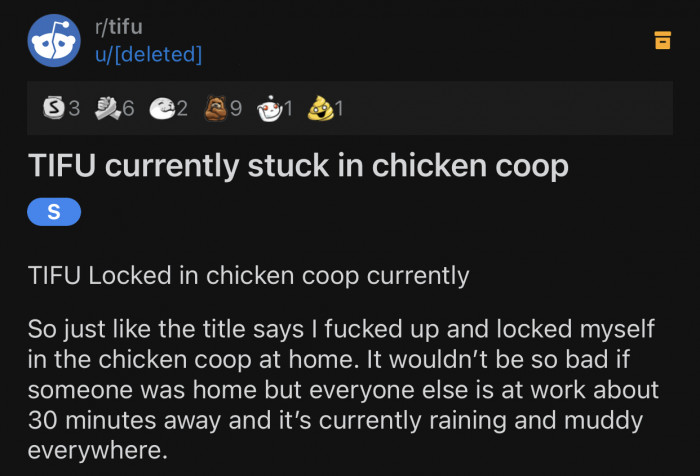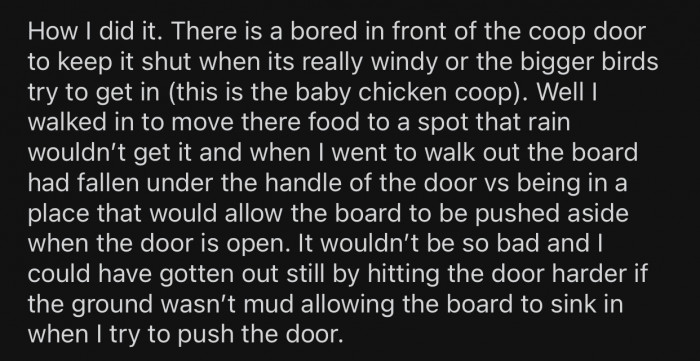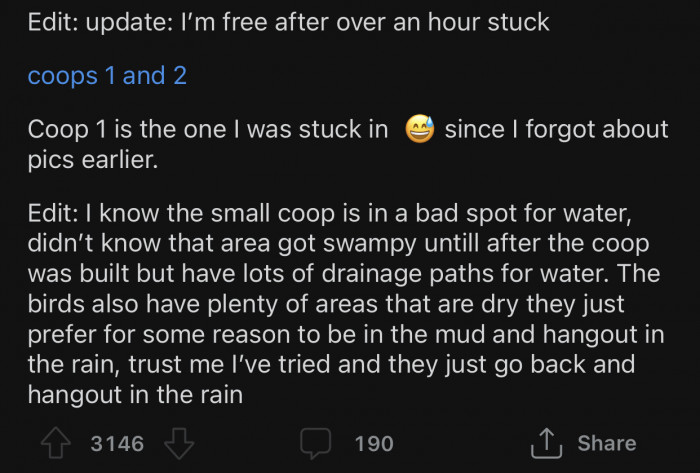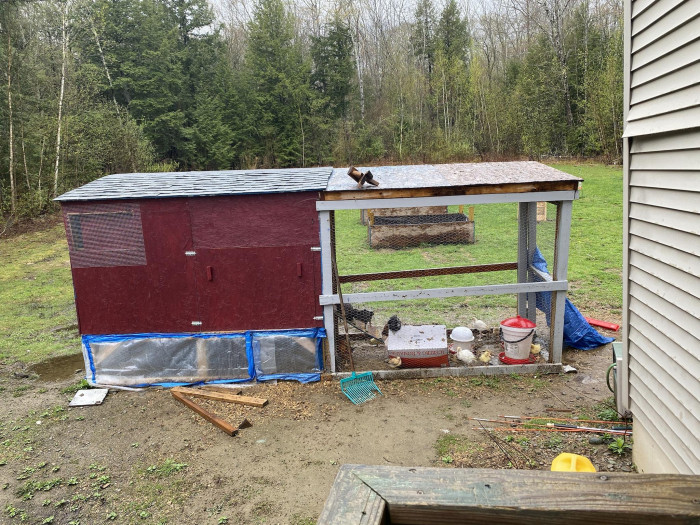Redditor Shares Live Updates While Stuck In A Chicken Coop On A Rainy And Muddy Day
Whenever you wake up in the morning, you never expect to eventually get stuck somewhere and be forced to spend a long time in a secluded place with nowhere else to go. It's one of the worst experiences people can go through, especially when you never know whether you will make it out of there.
Individuals with claustrophobia hate this situation even more than those without it. It is frustrating to be stranded somewhere, but when your body is not cooperating with you in that situation, things can feel much worse than they actually are.
In that precise situation, you become entirely reliant on someone else to save you from the mess you found yourself in. If no one bothers to show up or takes their time with the rescue, it can get pretty scary in there.
A Redditor who later deleted their account made a post on the r/tifu subreddit, where they shared live updates about being stuck in a chicken coop. The user eventually made it out of there and explained how it happened.
The Reddit community had many different reactions to the user's situation. Scroll down to check out the full Reddit post, and scroll a little further to read the comments from the original post.
Here's the original post by a Reddit user who later deleted their account:

OP got stuck in the chicken coop after a board blocked the door from opening.

You have to think of all the ways you could lock yourself in.

Psychological Impact of Isolation
Being stuck in a confined space, like a chicken coop, can evoke feelings of anxiety and panic. Research in environmental psychology shows that confinement triggers the body's stress response, leading to heightened cortisol levels and emotional distress.
Dr. David K. Rettew, a clinical psychologist, explains that prolonged isolation can exacerbate feelings of helplessness, especially for those with anxiety disorders. This aligns with the findings of studies that demonstrate how even mild forms of confinement can lead to significant psychological discomfort.
The Psychological Effects of Isolation
Being stuck in a confined space, such as a chicken coop, can evoke feelings of anxiety and frustration. Research in environmental psychology indicates that confinement can significantly impact mental health, leading to heightened stress and discomfort.
Understanding these psychological responses can help individuals develop coping mechanisms to manage stress in challenging situations.
OP eventually modified the post to include an update about their situation.

The link OP included in the screenshot above includes the following content:
"Coop 1"

"Coop 1 The Board Against The Door"

Claustrophobia, a specific phobia characterized by an intense fear of confined spaces, affects many individuals. According to research published in the Journal of Anxiety Disorders, this phobia often stems from negative experiences in enclosed spaces during childhood.
Understanding the origins of such fears can help individuals confront and manage them more effectively, emphasizing the importance of therapeutic interventions like exposure therapy in reducing anxiety and fostering resilience in similar situations.
This scenario also emphasizes the importance of situational awareness and preparedness. According to studies in cognitive psychology, being aware of one's environment and planning for contingencies can reduce anxiety and improve decision-making in stressful situations.
Developing these skills can empower individuals to navigate unexpected circumstances with greater confidence.
"Coop 1 The Board Against The Door And The Handle It Got Stuck In To"

"Coop 1 Indoor Handle"

"Coop 2"

Coping Mechanisms During Stress
In stressful situations, employing coping mechanisms can significantly mitigate feelings of panic. Techniques such as deep breathing and grounding exercises are effective in reducing anxiety, as highlighted by Dr. James Gross from Stanford University.
His research on emotion regulation suggests that mindfulness practices can help individuals stay present, reducing the tendency to catastrophize the situation. Practicing these techniques in less stressful environments can prepare individuals for unexpected challenges, promoting overall emotional well-being.
The Role of Humor in Coping
Interestingly, using humor as a coping mechanism can significantly alleviate stress. Research shows that laughter triggers the release of endorphins, promoting feelings of well-being and reducing stress.
In challenging situations, finding humor can serve as a protective factor, helping individuals maintain a positive outlook despite adversity.
"Latches On Coop 2, Same Latches On Inside Of Coop"

Here's how the Reddit community reacted to the user's post:

OP replied to the previous user's comment to answer their question:

The experience of being trapped can trigger a fight-or-flight response, leading to heightened anxiety and physical symptoms such as an increased heart rate. Dr. Lisa Feldman Barrett, a renowned emotion researcher, states, "Our emotions are not just reactions; they are constructed from our experiences and can be managed." You can find more about her insights on emotional regulation at lisafeldmanbarrett.com. Understanding these physiological reactions can empower individuals to develop healthier responses to stress, helping them navigate unexpected situations with greater ease and resilience.
Moreover, engaging in storytelling or sharing experiences can foster connection and reduce feelings of isolation. Studies indicate that social support is crucial for mental well-being, particularly during stressful experiences.
By sharing experiences with others, individuals can cultivate a sense of community and support, which can be vital for emotional resilience.
It was just a matter of time before someone went there.

Even OP's family found their situation pretty hilarious.

OP has to be careful and see a doctor.

Social Support as a Buffer
Research consistently shows that social support can act as a powerful buffer against stress. According to a study published in the American Journal of Public Health, individuals who perceive high levels of social support report lower levels of stress and anxiety.
In situations like being stuck in a chicken coop, maintaining communication with friends or family can help alleviate feelings of isolation and fear, providing emotional comfort even in physically confining circumstances.
Practical Strategies for Managing Stress
To manage stress effectively during challenging situations, experts recommend practicing mindfulness and grounding techniques. These methods can help individuals stay present and reduce feelings of panic or anxiety.
Additionally, engaging in physical activities, even within confined spaces, can help release built-up tension and promote a sense of calm.
The coop OP was stuck in had plenty of airflow.

As a wise man once said: "If something exists, there's p0rn of it."

Thankfully, someone was on their way to "rescue" OP.

Understanding the psychological concept of learned helplessness is crucial in situations of confinement. Research by Dr. Martin Seligman illustrates how individuals who feel they lack control over their circumstances often develop a sense of helplessness.
This phenomenon can be particularly detrimental when faced with unexpected challenges, emphasizing the importance of cultivating a sense of agency. Individuals can benefit from focusing on aspects of their environment they can control, even if small, to combat feelings of helplessness.
At least now we have cell phones to notify people about our situation.

OP had nothing but time to think about their situation.

Sometimes mud just gets in the way.

The Role of Cognitive Restructuring
Cognitive restructuring is a technique used in cognitive-behavioral therapy (CBT) to challenge negative thought patterns. Research indicates that reframing thoughts about stressful situations can significantly reduce anxiety levels.
According to Dr. Aaron T. Beck, founder of CBT, shifting focus from catastrophic thinking to problem-solving can empower individuals. In instances of confinement, practicing this technique can help individuals maintain a sense of control and reduce feelings of panic.
"Could be in a better location but didn’t have much choice when it was built."

Getting stuck somewhere is always a weird situation to deal with, especially when no one is around, and you have to wait for someone to rescue you; it feels like forever.
Thankfully, OP's family came to their rescue, and they managed to finally get out of the coop. If you enjoyed reading this, make sure to check out similar content on our platform.
Psychological Analysis
This experience highlights how confinement can trigger stress responses, reflecting our natural inclination to seek safety and comfort. Understanding these reactions can empower individuals to develop healthier coping strategies during challenging situations.
Analysis generated by AI
Analysis & Alternative Approaches
In conclusion, understanding the psychological effects of confinement and isolation can help individuals develop coping strategies for challenging situations. By fostering resilience and utilizing humor, individuals can navigate adversity with greater ease.
Ultimately, these insights can enhance emotional well-being and promote healthier responses to stress.
The psychological insights gained from research highlight the importance of understanding how confinement affects emotional well-being. Strategies such as grounding techniques, social support, and cognitive restructuring can significantly improve coping abilities.
As noted by the American Psychological Association, developing these skills is vital for resilience in stressful situations. By equipping ourselves with these tools, we can better navigate unexpected challenges and promote a healthier mindset in the face of adversity.



